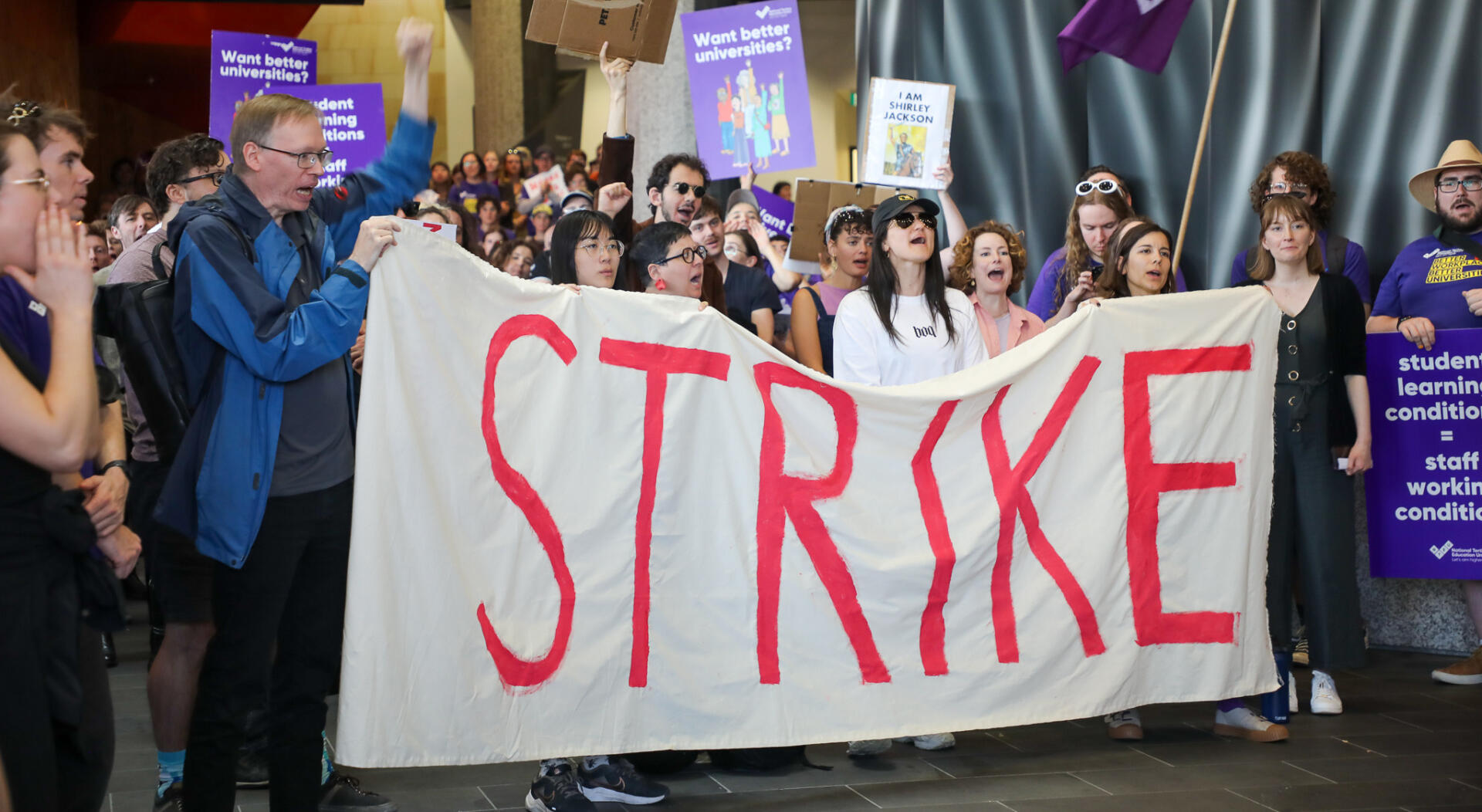Over 340 international students at the University of Melbourne are seeking a joint refund of hundreds of thousands of dollars in tuition fees lost during two week-long strikes by staff.
In October, hundreds of members of the National Tertiary Education Union (NTEU) conducted strike action across all faculties at the University of Melbourne. This came one month after a seven-day strike by NTEU members of the arts, fine arts and music faculties, and some student support staff.

About face: Pongpong Chen says she came to Australia “with the idea of experiencing western-style freedom and democracy,” but is now disillusioned. Photo: Gwen Liu
Qingqing Lu and Pongpong Chen are two student organisers of the joint tuition refund appeal. They are enrolled in the faculty of arts, which was most affected by the strikes.
Originally from China, Lu and Chen said their decision to launch a joint appeal and seek legal assistance was made after their individual efforts to find a fair solution hit roadblocks during talks with the university.
A University of Melbourne spokesperson told The Citizen: “[During the strike] we were focused on minimising the impact of union activity on our students. If industrial action interrupted classes or course delivery, alternative delivery arrangements were made.”
“I didn’t see any so-called ‘alternative arrangements’ in my subjects,” said Lu.
Chen said while her lecturer condensed a missed eight-hour intensive into the final semester’s class, the criminology student did not regard this as equivalent.
Lu said the refund group’s origins were a chat she initiated on Little Red Book, a Chinese-language social media platform, on 19 October.
“Over 160 students joined the group chat in just two or three days,” she said. The group had grown to over 340 members by 3 November, adding 100 members in the previous 24 hours alone.
“We were requesting either a refund or rescheduled classes,” said Lu, who quit her job in China to study media in Melbourne. “I will fight for [compensation for] living expenses if I need to take extra classes.”
She told The Citizen that she would need to work for three months in China to save two weeks’ tuition fees.

Opportunity costs: Qingqing Lu would need to work for three months in China to save the two weeks’ tuition fees lost in missed classes. Photo: Gwen Liu
Chen, who is in her first semester of studying criminology, said that she had four classes cancelled, including the eight-hour intensive class.
The twenty-three-year-old, who works at a sushi restaurant for $24 an hour, estimated she had lost thousands of dollars in tuition fees alone.
“My tuition is over $40,000 a year, nearly $5,000 per subject,” Chen said “I’m paying about $450 for a two-hour seminar, [so] I lost almost $3,600.
“I would have to stand there for 17 hours to make back what I lost in just one seminar.”
According to the latest annual report from the University of Melbourne, 41 per cent of its students are from overseas, generating 57 percent of student revenue for the richest Australian university.
Lu and Chen said they supported the academics’ pursuit of better working conditions, but believed students were “sacrificed” in the bargaining war between the university and the union.
Lu told The Citizen that she had been seeking a remedy for her loss in the two months since the September strike, first through the university’s student grievance process, then its student appeals process, and then to the president of the University of Melbourne Student Union (UMSU) and its advocacy team.
“They are passing the buck,” Lu said.
Chen said the student union’s advocacy service advised her it had received a number of similar recent enquiries, but those students’ complaints were dismissed by the academic registrar’s office.
“It is safe to say that it would be extremely unlikely that the university would consider fee relief or compensation in any form,” the UMSU advocacy service advised one student in an email seen by The Citizen.
UMSU president Hibatallah Adam, who missed at least eight law school classes due to striking staff, said she supported the overseas students’ joint appeal, but believed the refusal of previous cases meant they had little chance of success.

Holding the line: NTEU University of Melbourne branch acting president Chloe Mackenzie believes students should be compensated for missed tuition. Photo: Gwen Liu
NTEU University of Melbourne branch acting president Chloe Mackenzie said students should be compensated for missed tuition, especially when the university did not have to pay striking staff during the strike.
Dr Jeff Sparrow, a senior lecturer and NTEU delegate in the school of culture and communications, said students had been short-changed for a long time, not just during the strike.
“Students should be angry with the university,” said student union president Adam. “As an institution that charges international students very high tuition, the quality of education should not be affected.”
A spokesman for the Department of Education said the Higher Education Standards Framework 2021 requires education providers to ensure quality and integrity in education delivery.
Meanwhile, laws covering the provision of education to international students state that when education providers are unable to fully deliver their course of study, students can seek refunds or loans from the government-backed Tuition Protection Service.
The Australian Competition and Consumer Commission was contacted for comment but a spokesperson said the regulator was unable to respond before deadline.
Chen said she was disillusioned by the university’s response. “I came to Australia with the idea of experiencing western-style freedom and democracy, but I found it to be just like this,” she said.
Lu said that the university, ranked number one in Australia according to The Times Higher Education Rankings, didn’t live up to her expectations in terms of student care or teaching quality.
“I pay tuition. I get my education from the university… This should be a contract,” Lu said.
“If not, return my money.”
Gwen’s Liu’s breaking news story was also published by Crikey on 3 November 2023.



